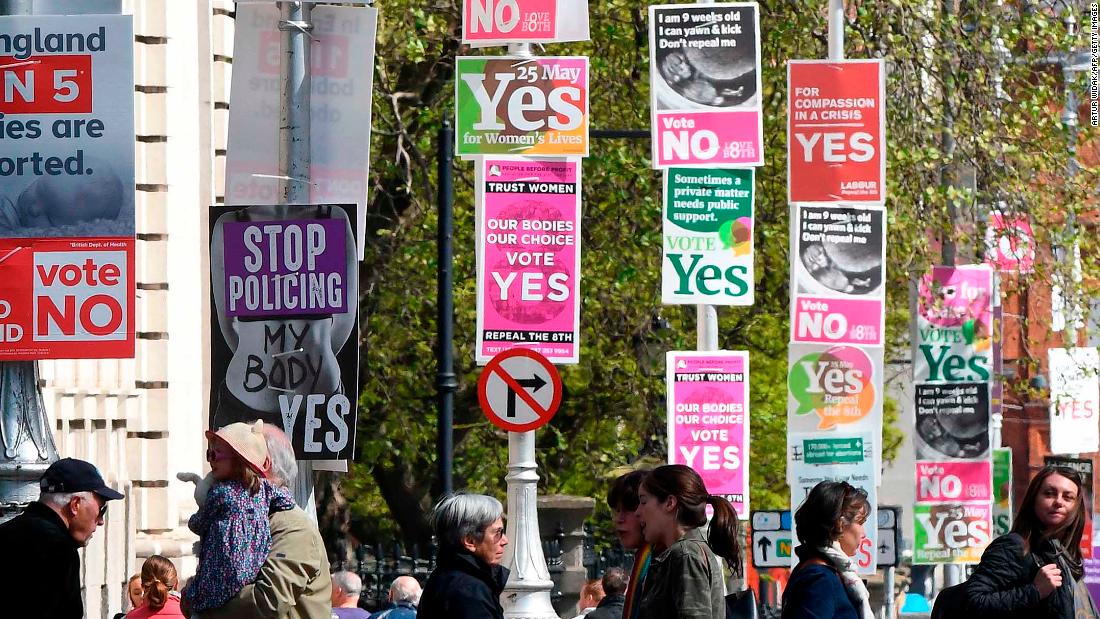[ad_1]
Exit polls are not based on the actual counting of ballots. Official counting begins Saturday at 9 a.m. (4 a.m. ET), with the final results expected late afternoon.
The Eighth Amendment, which was added to the constitution following a referendum in 1983, places the rights of the fetus and the rights of its mother on equal footing, effectively banning abortion barring a “real and substantial risk” to the mother’s life.
If the referendum ultimately passes, Irish lawmakers are expected to enact legislation allowing for terminations in the first 12 weeks of pregnancy — and later in cases where there is a risk to the mother’s life or the fetus is not expected to survive.
If early indications are wrong, and a No vote is secured, Ireland’s abortion laws — some of the strictest in the developed world — will be kept in place.
High turnout was seen across 6,500 polling stations in 40 constituencies across the republic Friday. If the final turnout, which will be released Saturday, surpasses 60.52%, it will be higher than Ireland’s referendum on same-sex marriage, which passed in 2015. Turnout was over 70% in some areas, RTE reported.
Support appeared to decrease with age. The exit poll said repeal was supported by 87.6% of voters 18-24 years old; 84.6% of voters 25-34 years old; 72.8% of voters 35-49 years old; and 63.7% of voters 50-64 years old.
Voters over 65 were the only age group overall not supporting the amendment, with 58.7% voting no, the poll said.
Voters throughout the country were graced with beautiful weather all day, and a mixed atmosphere of excitement and anxiety was felt at polling stations.
Jerry Moynihan voted at the Two Mile Community National School in Killarney, in Ireland’s rural southwest. He told CNN he was happy to be exercising his democratic right and spoke about how this referendum felt different to him, referencing Ireland’s historical connection to the Church.
“It’s an important day for Ireland. I think it’s a very Irish thing. It isn’t the Church anymore that’s dictating to us. I think it’s a moral thing for the Irish [to decide]. It’s not a Catholic thing anymore,” he said.
Caroline Killeen, 52, said she was “very passionate” about the vote, adding that she was “anxious, excited and nervous” to get the results.
“I think it’s important to vote every opportunity you have — as a woman and as a citizen of whatever country you are in. And, to honor our predecessors and what they fought for us to be able to do this,” Killeen said.
“I have daughters and just because my ancestors didn’t have a vote doesn’t mean my daughters shouldn’t have a right to their opinion.”
A long campaign
Abortion-rights activists who campaigned for a Yes vote Friday have long argued that the Eighth Amendment punishes women and doesn’t stop abortions, which are exported — mostly to the UK — instead.
Their longstanding campaign to repeal the Eighth, as it is commonly known, has made some progress over the past three decades, including the 1992 X Case, which made it legal for Irish women to travel abroad for abortions, adding the threat of suicide as grounds for abortion.
In 2013, Savita Halappanavar died of sepsis after being denied a termination of a miscarrying fetus in a Galway hospital, prompting the government to pass a bill allowing abortions when a woman’s life is in danger.
And in June 2016, the UN’s Human Rights Council ruled that the country’s abortion regime subjected Amanda Mellet, a dual Irish-American national, to “cruel, inhuman and degrading treatment,” and called on the Irish government to reform its laws. Later that year, in a similar case, the UNHRC ordered that Ireland compensate Siobhán Whelan for harm caused to her as a result of the near-total ban on abortion.
Anti-abortion activists who voted No have argued that the Eighth Amendment has saved thousands of lives and encouraged compassionate alternatives to abortion, such as perinatal hospice care when the baby is not expected to survive or adoption for babies born to women in challenging circumstances.
CNN’s Jennifer Hauser and Ralph Ellis contributed to this report.
[ad_2]
Source link





